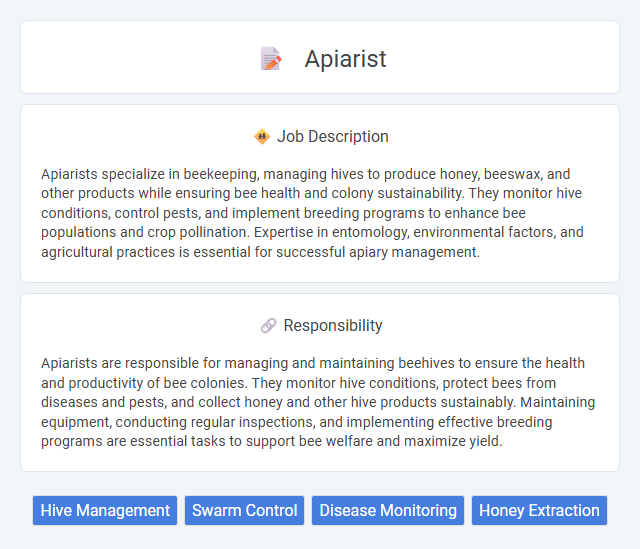
Apiarists specialize in beekeeping, managing hives to produce honey, beeswax, and other products while ensuring bee health and colony sustainability. They monitor hive conditions, control pests, and implement breeding programs to enhance bee populations and crop pollination. Expertise in entomology, environmental factors, and agricultural practices is essential for successful apiary management.
Apiarist work likely suits individuals who are comfortable with outdoor environments and possess patience for handling bees carefully. Those prone to allergies or fear of insects may find this profession challenging or unsuitable. Developing steady hands and observational skills is probably essential for success in maintaining healthy hives.
Qualification
Apiarists typically require knowledge in entomology, biology, or agriculture, often supported by a bachelor's degree in these fields. Hands-on experience with bee colony management, pest control, and honey extraction is essential for effective apiary operations. Certifications in beekeeping and safety training in handling bees further enhance an apiarist's qualifications.
Responsibility
Apiarists are responsible for managing and maintaining beehives to ensure the health and productivity of bee colonies. They monitor hive conditions, protect bees from diseases and pests, and collect honey and other hive products sustainably. Maintaining equipment, conducting regular inspections, and implementing effective breeding programs are essential tasks to support bee welfare and maximize yield.
Benefit
Apiarists likely enjoy several benefits, including the potential for income through honey production and the sale of beeswax and other hive products. There is a probable enhancement of environmental health due to their role in pollination, which supports biodiversity and agriculture. Job satisfaction may be high from working outdoors and contributing to sustainable practices.
Challenge
Apiarist work likely involves managing unpredictable challenges such as fluctuating weather conditions and the health vulnerabilities of bee colonies. The probability of encountering issues like colony collapse disorder or pesticide exposure may require constant adaptation and problem-solving. Success in this role often depends on a deep understanding of bee behavior and environmental factors that influence hive productivity.
Career Advancement
Apiarists specializing in bee management gain expertise that enables progression to roles such as senior beekeepers, hive inspectors, or agricultural consultants. Developing skills in hive health monitoring and honey production can lead to opportunities in research or apiary business management. Certifications in pest control and sustainable beekeeping practices enhance prospects for leadership positions within environmental or agricultural organizations.
Key Terms
Hive Management
Apiarists specializing in hive management ensure the health and productivity of bee colonies by monitoring hive conditions, controlling pests, and optimizing hive placement. They conduct regular inspections to assess brood patterns, honey stores, and queen vitality, implementing necessary interventions to prevent diseases and swarming. Effective hive management directly influences honey yield and supports sustainable pollination practices essential for agriculture.
Swarm Control
Apiarists specializing in swarm control expertly manage honeybee colonies to prevent swarming, which can significantly reduce hive productivity. Techniques such as hive expansion, strategic splitting, and queen management help maintain colony stability and ensure optimal honey production. Implementing swarm control practices minimizes the risk of losing valuable bees and supports sustainable apiary operations.
Disease Monitoring
Apiarists specialize in disease monitoring by regularly inspecting bee colonies for signs of common ailments such as Varroa mites, American foulbrood, and Nosema. They use diagnostic tools and sampling techniques to detect infections early, ensuring timely treatment and preventing colony collapse. Effective disease monitoring is crucial for maintaining hive health and maximizing honey production.
Honey Extraction
Apiarists specializing in honey extraction utilize advanced techniques to safely remove honey from beehives without harming the bees or compromising honey quality. They operate specialized equipment such as honey extractors, uncapping tools, and filtration systems to efficiently harvest and process honey. Mastery of hygiene standards and seasonal timing ensures optimal yield and purity of the final product.
 kuljobs.com
kuljobs.com